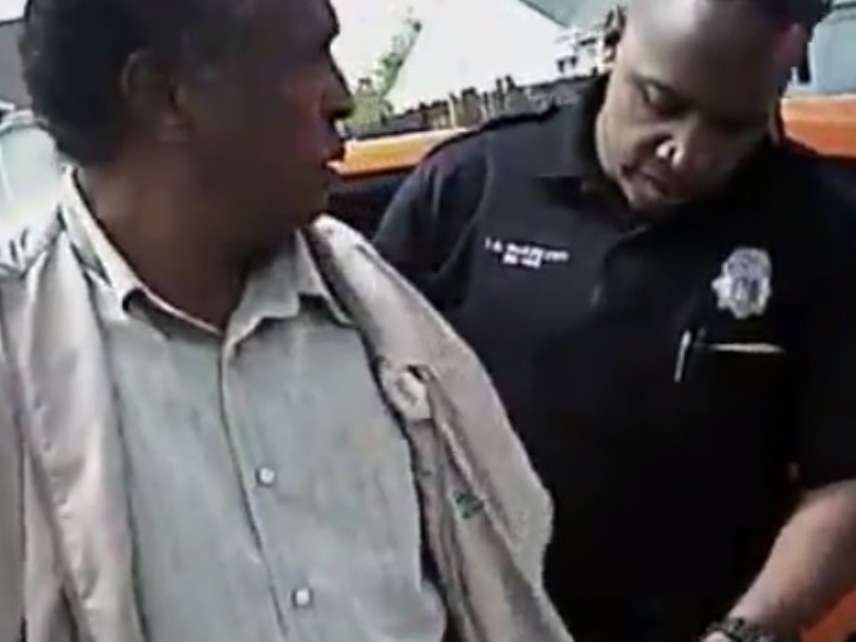Denver Cashes in by Seizing Cars for Low-Level Crimes, Even Without Convictions
The city earns more than $2 million a year grabbing more than 1,800 vehicles.

Denver cab driver Semere Fremichael got caught up in an undercover prostitution sting. He was innocent—he thought she wanted a ride, not sex for pay—and was acquitted by a judge.
His taxi, however, got taken for a rough ride. Denver's Fox affiliate has an excellent two-part investigation showing how the city attorney's office is using civil asset forfeiture to cash in by snatching vehicles like Fremichael's for even low-level crimes, and even when their owners aren't convicted.
In 2016, Denver made more than $2.4 million, seizing more than 1,800 vehicles enforcing the civil forfeiture component of its public nuisance abatement laws. Civil forfeiture is a controversial procedure that allows cities (and states and the federal government) to seize and keep somebody's assets and property without actually convicting them of a crime.
Denver put the screws to Fremichael, according to Fox reporter Rob Low, offering him a civil version of a plea deal: He could get the car back in 30 days if he gave them $1,000. Or he could demand a civil hearing. If he lost, it would cost him $6,000 and he could lose the car for a year. He took the deal, and says he probably lost an additional $2,500 because he couldn't use his cab for a month, even though he committed no crime.
City Attorney Kristin Bronson defends the seizure of these cars on camera, but doesn't acquit herself well (pun unintended). Bronson insists she isn't abusing forfeiture because the ordinance has been around for 20 years. Which could mean Denver has been abusing the law for a long time.
She also defended the citizen hearing process, which worked out rather poorly for Fremichael. Much like criminal plea bargains, Fremichael was put in a position to accept a small penalty or risk facing an even worse punishment. The risks are even higher for Fremichael because civil trials and hearings use lower evidence standards. It was easier for Fremichael to lose his car in a civil hearing than for him to be convicted of soliciting prostitution.
Low and his team, having talked to two municipal judges, could find no cases out of the hundreds of seizures every year of citizens requesting a hearing. Bronson argued that this was evidence that the system works and is proof that the city was offering "fair settlements."
But as a sharp cotntrast to Bronson's claim, Low also interviewed Greg Rawling, a former city attorney who used to prosecute these public nuisance cases for Denver. Rawling told Fox, on camera, the city seized the cars "because they can" and said they were in it for the money.
Another important contrast: The Denver district attorney's office generally requires a conviction before seizing and keeping somebody's vehicle, Fox reported. As a result, their office seized five cars, compared to the city's 1,821, in 2016.
Colorado earlier this year passed some civil asset forfeiture reforms that increased forfeiture transparency and made it harder for police to participate in the federal asset forfeiture sharing program for low-level cases. But that doesn't apply here to what Denver is doing. Fox also interviewed a state representative who helped usher in these asset forfeiture law reforms. She's on a task force to consider additional changes to forfeiture laws, and she makes it clear Denver's behavior has her very concerned.
Watch both parts of Low's investigation here. Kudos, by the way, for how Low and Fox news handled this investigation and story. Local news outlets have a reputation for simply swallowing what police and prosecutors say on crime-fighting and asset forfeiture methods and parroting back the official line. This Fox piece does not, and they do an excellent job getting to the heart of the weird and complex operations of asset forfeiture in a way that's easy for viewers to understand.
These details are very important when we have folks like Deputy U.S. Attorney General Rod Rosenstein trying to convince Americans that asset forfeiture is all about fighting the Bernie Madoffs of the world. What happened to Fremichael is the more likely outcome when citizens do not get strong due process protections for their property.
Bonus link: The City of Albuquerque, New Mexico, has been similarly aggressive in trying to seize cars and has been sued over it.

Show Comments (26)